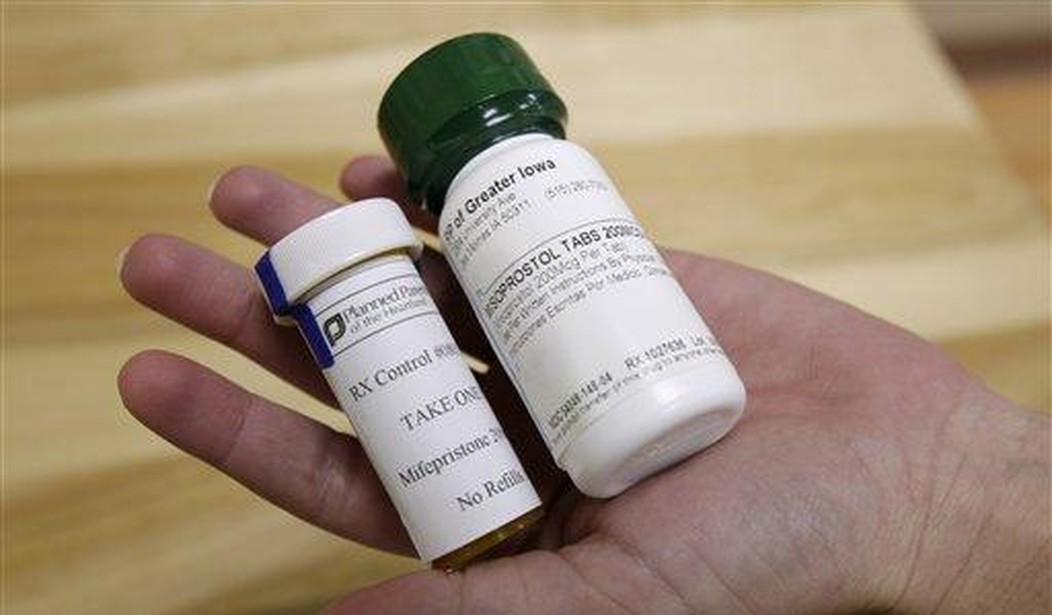The Food and Drug Administration (FDA) certainly dominated the news cycle this week. On Tuesday, the FDA and CDC recommended a pause of the Johnson & Johnson single dose vaccine, as Leah and Guy reported, because six women developed possible blood clot side effects. Also on Monday, though, as Reagan reported, the FDA announced it is doing away with abortion pill regulations requiring women to have an in-clinic visit. Women can now receive the drugs in the mail or over telemedicine.
Guy has thoroughly explained the consequences of the decision to pause the vaccine. The New York Post also published an editorial aptly titled "Team Biden halts J&J vaccine — and a return to normal."
The FDA's decision on the abortion drugs Mifepristone and Misoprostol, has a lesser known, but still prevalent connection to the pandemic. This decision will also be responsible for countless deaths.
While the FDA had advocated for Risk Evaluation and Mitigation Strategy (REMS), which are a matter of common sense health and safety measures, that was during the Trump administration.
Last July, U.S. District Judge Theodore Chuang in Maryland ruled FDA regulations necessitating an in-person visits create a “substantial obstacle.” Judge Chuang was appointed by pro-abortion President Barack Obama in 2014. The U.S. Supreme Court on January 12 reinstated the REMS in ACOG v. FDA. But, as Alice Miranda Ollstein and Darius Tahir of Politico opened their reporting on Monday with, "The Biden administration is lifting restrictions on dispensing abortion pills by mail during the Covid-19 pandemic, reversing a Trump administration policy that the Supreme Court backed in January."
Recommended
Abortion advocates have long lobbied against in-person visits. They were able to use safety precautions during the pandemic as their excuse, this time. The real matter of "safety" though entails how relaxed the rules now are for a woman to undergo an abortion.
Chemical abortion is now the term used to describe this procedure. A woman will take Mifepristone which will cut off nutrients to starve her unborn child. A day or two later, she will take Misoprostol, which induces contractions. At home, without doctor supervision, a woman's body will expel the dead child. If this sounds like a woman has to give birth to her dead baby, which she will then flush down the toilet, it's because that's exactly what this is.
This method is depicted in the 2019 movie "Unplanned," and is explained over Live Action's Abortion Procedures site, as well as This is Chemical Abortion, a project from Students for Life of America.
Not shockingly, this method is particularly dangerous. It carries with it four times the complications of surgical abortions. Incomplete abortions happen 5 percent of the time, with some studies finding 10 percent of women facing incomplete abortions at 9-weeks gestation. This can lead to death from infection if remaining fetal parts or tissue are not properly removed.
Side-effects and risk associated with this method include abdominal pain, nausea, vomiting, diarrhea, weakness, fever/chills, and headaches. The bleeding may last for weeks after the abortion.
It's also gaining popularity. Thanks to this method--which accounted for 41 percent of abortions in 2018--total abortions have actually increased.
When a woman doesn't have to go to the doctor to get her abortion drugs, it means she will undergoing this method without a doctor even examining her beforehand. This means that, without an ultrasound, a doctor cannot confirm that the woman is at less than 10-weeks gestation, which is as far into pregnancy as the FDA will approve of. Without an ultrasound, a doctor cannot confirm that the pregnancy is developing normally, rather some place else, such as the fallopian tubes. This kind of pregnancy, an ectopic pregnancy, is not viable, can kill a woman, and removing it is not considered an abortion. Chemical abortion will not remove the ectopic pregnancy.
Again, these drugs are already dangerous, significantly more so than surgical abortion procedures. These risk factors not only make the method that much more deadly, but are preventable.
If there's ever an abortion method to regulate, it ought to be this one.
In addition to the website linked to above, Students for Life of America has been quite active in raising awareness about the dangers involved in chemical abortions. A Students for Life of America Action press release quoting Kristan Hawkins, the President of Students for Life and Students for Life Action, reads in part:
“The Biden Administration makes catastrophic loss of life by mail its legacy in choosing to weaken the minimal health and safety in place to protect women from the deadly consequences of Chemical Abortion Pills. Sending deadly pills through the mail without any pre-screening or follow up care is convenient and cost effect for Corporate Abortion, but women will pay the price along with countless preborn infants.
“This administration follows in the reckless footsteps of first Bill Clinton who forced a deadly concoction of pills on the market that now ends more than 40 percent of preborn life from abortion and later Barack Obama who permitted the health and safety standards first recommended to be weakened.
“The FDA Acting Commissioner’s letter indicating an end to the in-person dispensing requirement for deadly Chemical Abortion pills callously notes that while there are ‘limitations’ to the studies that have examined the deadly drugs, ‘increases in serious safety concerns’ don’t seem to rise if women are left alone. Such dismissive language doesn’t change the fact that some women will experience dangerous bleeding, infection, loss of future fertility and maybe even their lives.
Kristi Hamrick, the Chief Media and Policy Strategist of Students for Life of America and Students for Life Action, also warned last May in the Washington Examiner that "Abortion pills without Rh-testing could prevent many women from ever having children."
A Tuesday release from the Charlotte Lozier Institute also warned of further concerns than those already mentioned above. These include, with original emphasis:
- Multiple studies demonstrate that complications are four times more frequent in chemical than surgical abortions. These include emergency room visits, pain and bleeding, possible visualization of the unborn child, and more.
- Lack of FDA oversight on chemical abortions leads to lack of reporting adverse events if they are non-fatal.
- Less oversight from a physician will lead to lack of knowledge about the possibility for abortion pill reversal for women who change their mind after taking the first abortion pill.
- Increased sale of chemical abortion pills on the black market in bulk without an in-person doctor visit will increase the likelihood of women being subjected to chemical abortion without their consent.
- Chemical abortion is on the rise, and removal of FDA guidelines will only compound this and put more women in danger.
Abortion pill reversal may be possible if a woman who regrets taking the first drug takes progesterone soon enough afterwards and does not take the second drug. You can learn more about that option through Heartbeat International's Abortion Pill Rescue project.
Americans United for Life brought up another, very pro-woman point. In an amicus brief, AUL raised concerns that women who do not go into a clinic for the abortion drugs cannot be properly screened for domestic abuse, which can involve coerced abortions. Forced abortions are far from pro-choice.
According to the FDA's own documents, as of December 31, 2018, there had been 4,200 "adverse events," including 24 deaths.
Even on its own, without being overshadowed by the pause of the J&J vaccine, the FDA's decision on these abortion regulations is bad enough. Side by side, however, it demonstrates an almost perverse distortion of priorities. Any way you look at it, the FDA has blood on its hands.























